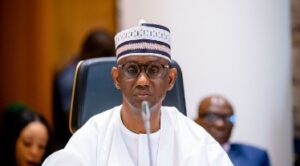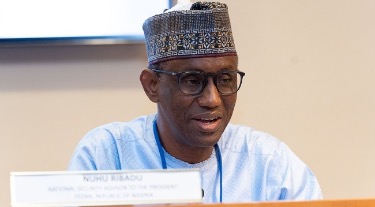The National Security Adviser, Nuhu Ribadu, has issued a stern warning to the Deputy Governor of Kano State, Aminu Gwarzo, threatening to initiate a defamation lawsuit over allegations made by Gwarzo.
The Deputy Governor has accused Ribadu of facilitating the return of the dethroned Emir of Kano, Aminu Ado Bayero, by allegedly providing him with two private jets.
Ribadu has vehemently denied these allegations and has expressed his intention to seek legal redress if the Deputy Governor fails to retract his claims.
In a formal letter addressed to Gwarzo, Ribadu’s legal representatives from Aliyu & Musa Chambers demanded an immediate and unconditional retraction of the statements, accompanied by a public apology.
The letter stipulates that the Deputy Governor must tender his apology within a 24-hour timeframe. Moreover, the apology must be disseminated through five national dailies with extensive national coverage, as well as on popular online platforms.
Failure to comply with these demands, according to Ribadu’s counsel, will result in legal action being taken against Gwarzo.
This development has stirred significant public interest, given the high-profile nature of the individuals involved and the historical context surrounding the dethroned Emir of Kano.
Aminu Ado Bayero’s dethronement and subsequent return have been contentious issues, and the allegations against Ribadu have added another layer of complexity to the situation.

Nuhu Ribadu, who has a storied career in Nigerian politics and law enforcement, including his tenure as the pioneer chairman of the Economic and Financial Crimes Commission (EFCC), is known for his firm stance on integrity and public service.
His decision to challenge the allegations legally underscores his commitment to maintaining his reputation and addressing what he perceives as baseless and damaging claims.
The legal community and political observers are keenly watching how this situation unfolds. If Gwarzo fails to issue the required public apologies, it is expected that the case could set a significant precedent in Nigerian defamation law, particularly involving high-ranking officials.
The insistence on a public apology in multiple national dailies and online platforms indicates the seriousness with which Ribadu views the allegations. It also highlights the potential reputational damage that such accusations can cause, not just to the individuals directly involved but also to their offices and the broader political landscape.
As the deadline for the Deputy Governor’s response looms, the public awaits his next move. Will he comply with Ribadu’s demands, or will he choose to face a potentially protracted and high-profile legal battle?.
The outcome of this confrontation will likely have significant implications for the political dynamics in Kano State and the wider Nigerian political scene.
In any case, this dispute serves as a reminder of the potent mix of politics, law, and personal reputations in Nigeria’s public sphere, where allegations can swiftly escalate into major controversies with far-reaching consequences.




